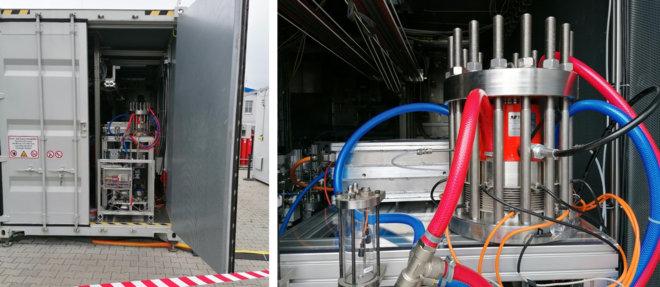
Compact high-pressure electrolysis for urban areas

Project title:
Sektorlyseur - Compact high-pressure electrolyser for integrated energy uses (Sektorengekoppelter Kompakt-Hochdruckelektrolyseur)
Subproject:
Development and assessment of application scenarios for a cross-sectoral increase in energy efficiency of buildings and neighbourhoods in the fields of electricity, mobility and heating by using compact high-pressure electrolysers
Funding institutions:
Free State of Thuringia, European Fund for Regional Development (EFRE)
Project duration:
01.06.2019 - 31.05.2021
Principal investigator of the project:
Prof. Dr. Mark Jentsch
Project partners:
AVX/Kumatec Hydrogen GmbH & Co. KG, ISLE Steuerungstechnik und Leistungselektronik GmbH
Team members involved in the project:
Nicole Meyer M.Sc.
Project outline
Hydrogen from renewable electricity is a proven means of increasing energy efficiency and reducing emissions also for tasks that go beyond industrial applications. Namely, hydrogen solutions can make a contribution to cross-sectoral energy system transformation at a small scale, for example at the district level in urban areas. This is the starting point of the Sektorlyseur project that investigates the small-scale production of hydrogen from fluctuating renewable electricity in conjunction with its usage in various fuel cell applications in micro-mobility solutions, small-scale appliances and solar home hydrogen systems. The objective of the project, which is supported by the Thüringer Aufbaubank (TAB) and the European Regional Development Fund (EFRE), is the development of a compact high-pressure electrolyser (Sektorlyseur) (AVX/Kumatec) with an integrated power supply (ISLE) in a power range from 2 kW to 10 kW. Complementing the technical development and implementation of the electrolysis system, the Bauhaus-Universität Weimar investigates and evaluates different operating scenarios for an optimised hydrogen production. This is undertaken in relation to the electricity supply from renewable energy sources and the various energy requirements of the applications that are being considered. A simulation model fed with measured data will provide insights into the market potentials for hydrogen produced with the compact high-pressure electrolyser, also including storage systems. In order to achieve a profitable operation of fuel cells in small-scale mobile applications, a space and weight-saving hydrogen storage system that can be easily filled is required. Here, cartridges are the preferred solution, as they are quick to replace and their dimensions and storage capacity can be adapted to suit the respective application's requirements.
Acheiving a larger range and more payload in mobile applications with hydrogen - initial results
A first evaluation of simulations conducted with measured data for micromobility application examples shows, that with respect to the achievable range and possible payload, a compact design of fuel cells and hydrogen storage systems can offer advantages over other drive technologies in mobility applications. The data evaluation carried out so far shows that it is possible to double the time of use or the permissible payload in comparison with battery-powered models. The extended payload option is particularly interesting because systems that are available on the market to date do not allow the transport of heavy equipment such as sensor technology for building monitoring. Mobile equipment in gardening and landscaping represent a further field of application for the novel electrolyser, that is being investigated by the Bauhaus-Universität Weimar. In a next step the data will be worked up in order to determine an optimised design for the cartridge system for different applications. This then forms the basis for evaluating the market potentials.
Outlook on the options for energy self-sufficient domestic buildings
In addition to the mobile applications mentioned above, the operation of the small scale electrolyser in conjunction with a solar home hydrogen system appears a promising option. Therefore, the project is investigating to what extent the system can serve to establishing an energy self-sufficient 3-person household of an average energy consumption. The aim is to use seasonal peaks in solar photovoltaic energy generation for the conversion of water into hydrogen and to store the hydrogen in a 100 bar long-term storage tank for later conversion back into electricity (or for thermal energy use).

Innovation
The development of a powerful small-scale compact high-pressure electrolyser capable of supplying hydrogen at a pressure of 100 bar closes a gap in current hydrogen infrastructure systems. Existing electrolysers are mostly limited to an output of hydrogen at 30 to 40 bar and their capacities are either geared towards a very small hydrogen demand at a laboratory scale or a large demand at an industrial scale. The novel compact electrolyser opens up new application potentials and new user groups within a grass-root development towards distributed hydrogen infrastructure systems. Furthermore, cross-sectoral use of the hydrogen produced with the electrolyser is conceivable by linking various small-scale applications (e.g. micro-mobility in conjunction with a solar home hydrogen system). This would also mean that a central element of the energy system transformation, namely sector integration, is being achieved at the household level.
